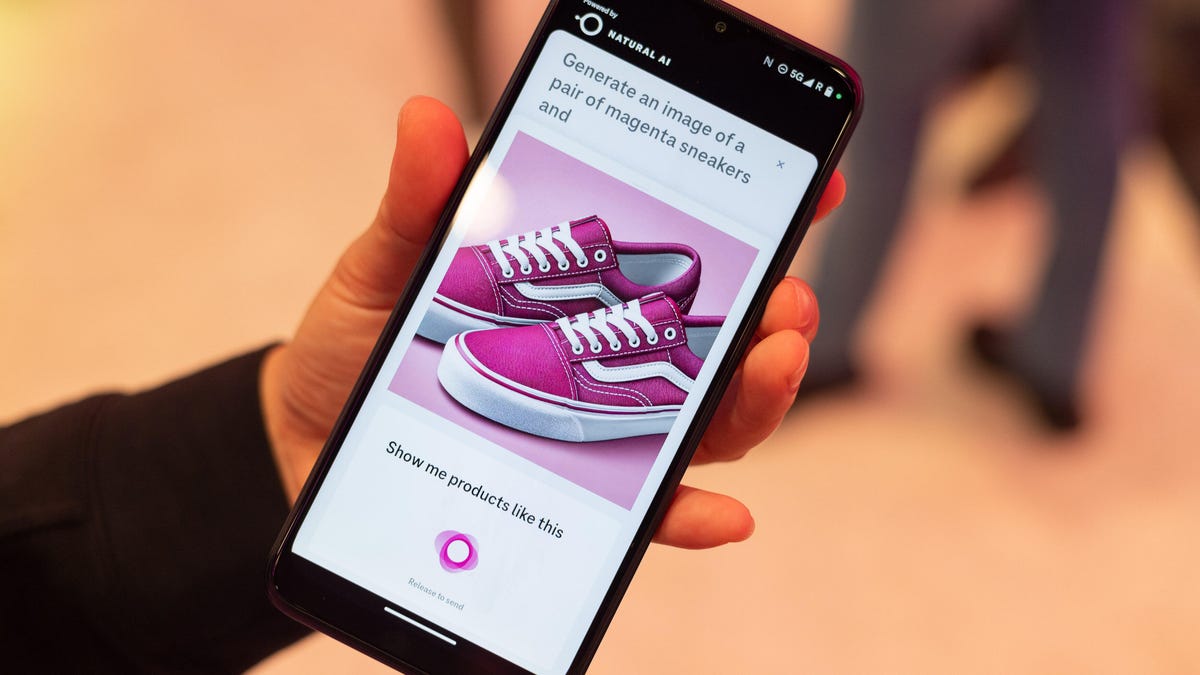AI Could Replace the Apps on Your Phone. I've Seen It With My Own Eyes
A concept phone at MWC demonstrates how AI has the potential to radically transform the way we interact with our personal devices.

Could AI render apps irrelevant and outdated?
In the Deutsche Telekom booth at Mobile World Congress, I'm watching a generative AI tool construct a custom phone interface to help me book a flight in real time. It's breathtaking, and almost too much to take in -- but in a good way.
The technology, currently called the T Phone, is the combined effort of the German carrier and San Francisco-based artificial intelligence company Brain.AI.
As Brain.AI CEO Jerry Yue shows me what the T Phone can do, he tells the device to book a flight from here in Barcelona to Los Angeles on March 12 for two people in first class. The phone pauses for a minute before pulling up a list of flights, methodically arranged on the home screen. Once Yue finds the best flight, he can pay for it using his mobile payment system of choice, without having to swap to another app or service.
"Usually we do a lot of things in our head when we're using our app systems today," Yue tells me. "Now you can just throw an idea at an AI and have it build out that entire flow for you."
A little more than a year on from the era-defining release of ChatGPT, the 2024 edition of MWC is all about the promise of AI. Beyond the hype, some of the most interesting approaches involve incorporating AI into devices and harnessing their computing power to do exciting new things -- some of which are easier to comprehend than others.
The T Phone concept is this: Instead of a phone that's designed around apps, as we're accustomed to, this phone uses generative and interactive AI to create a natural-feeling back and forth that'll help you navigate a task. The device has an AI button on the side that activates your AI assistant, which is waiting to spring into action and fulfill your command, like a personal genie.
Is it now our destiny to live in an app-free world? Tim Hoettges, Deutsche Telekom's CEO, certainly thinks so. Speaking at MWC on Sunday, he predicted the death of phone apps within the next five to 10 years. His reasoning? AI is going to kill them.
And his evidence? The T Phone.
The T Phone generated this interface on its own.
AI on the fly
Watching Yue's demo, at first I can't wrap my head around the idea that the phone isn't just bouncing between the Skyscanner, browser and Amazon apps in response to his requests. But instead it's assembling all the information it thinks he'll need and arranging it in what it thinks will be the most useful display format on the home screen.
"As you can see, it's kind of constructing interfaces on the fly based on contextual understanding of who you are," Yue says. "Your words generate this interface."
It's the first time I've seen a phone that works like this, and I'm sure the technology has a long way to go before it might actually end up being the default way of interacting with our phones -- but once I get it, it really seems to make sense. It feels like the most radical reimagining of how we interact with a smartphone since Apple introduced the App Store for the iPhone more than 15 years ago. Instead of making apps core to the experience of the phone, the phone's AI taps into the services' APIs, working out which tools and info are useful and necessary for responding to a particular command.
The idea is that the tech can work on different types of phones, including budget devices where the computing will take place in the cloud. But for it to work on a high-end device, the AI computation takes place on the phone itself, with help from a Qualcomm Snapdragon 8 chipset. Ziad Asghar, who oversees Qualcomm's AI roadmap, praises the T Phone's ability to compress a supposedly straightforward task into a single experience.
He uses the example of making a restaurant reservation, when you often need to switch back and forth between Google Maps, Yelp, OpenTable, your calendar and your messaging app. "You've gone through five different applications to be able to do this, but an interface that's like a virtual assistant on the device should be able to do all of that for you," he says.
The next stage of Yue's demo involves generating new interfaces based on the interfaces that the T Phone had already generated. "We call this anything to anything," says Yue. I braced myself to feel confused all over again.
Brain.AI surfaces product recommendations from more than 7,000 retailers.
Yue shows me what he means, by pressing his thumb on a Kindle that's been suggested in shopping results and asking the T Phone to show him an unboxing video. The screen divides in the middle and a YouTube video appears in the bottom half. He continues to ask questions: what size is the screen, how do the reviews compare it to similar products, and so on. Each time, the interface regenerates or readjusts to keep pace with his queries. "It's literally flowing with my thinking," he says.
I get it. What seemed so foreign to me when I first explored Yue's vision now feels like a glimpse of things to come. I can envision how communicating with our devices this way could feel natural and humanizing compared to how we do things now.
"Generative AI and AI increases the productivity that we have in our daily lives, takes away some of the mundane and routine work and gives you more time to do what's probably much more important," Qualcomm's Asghar says.
"This is just kind of the initial phase here," he adds. "There's a lot more to come."

